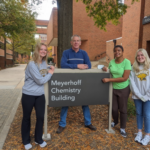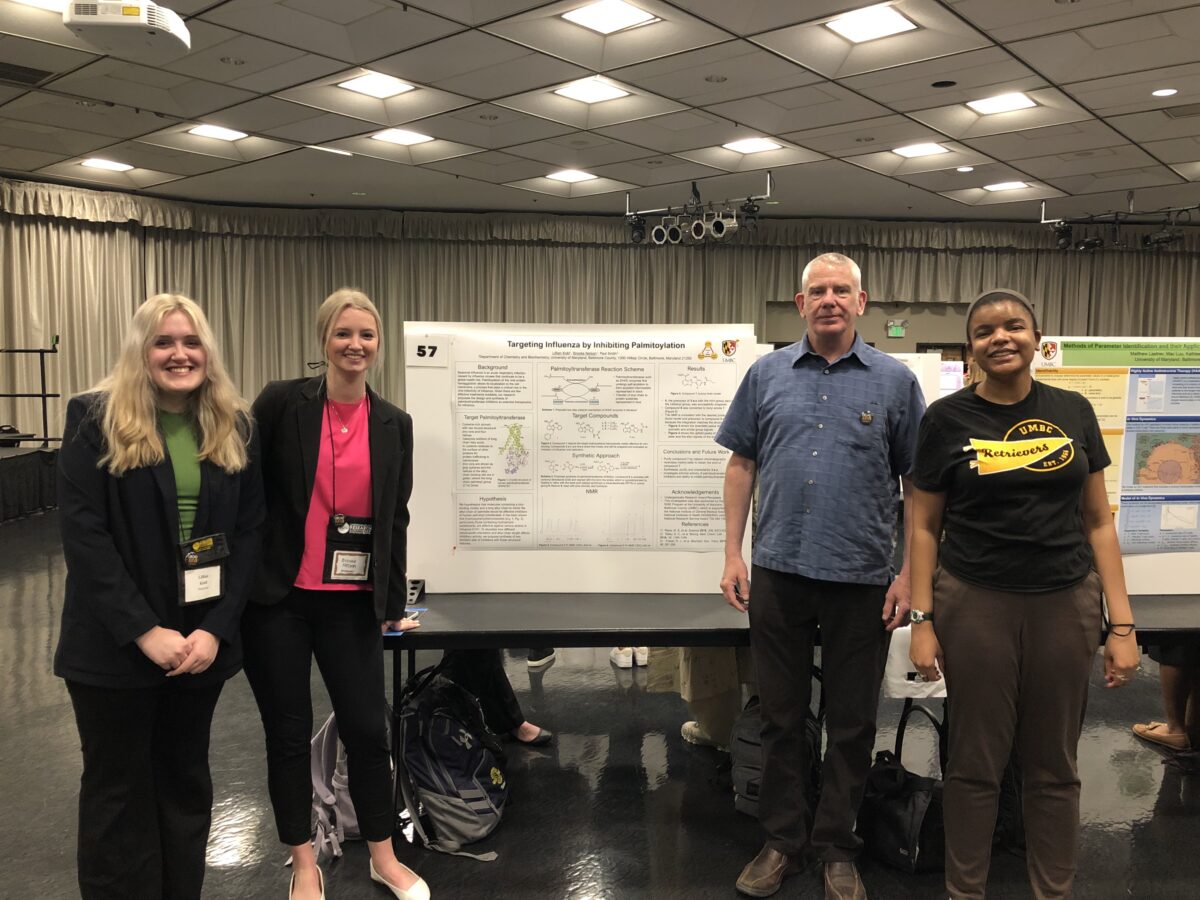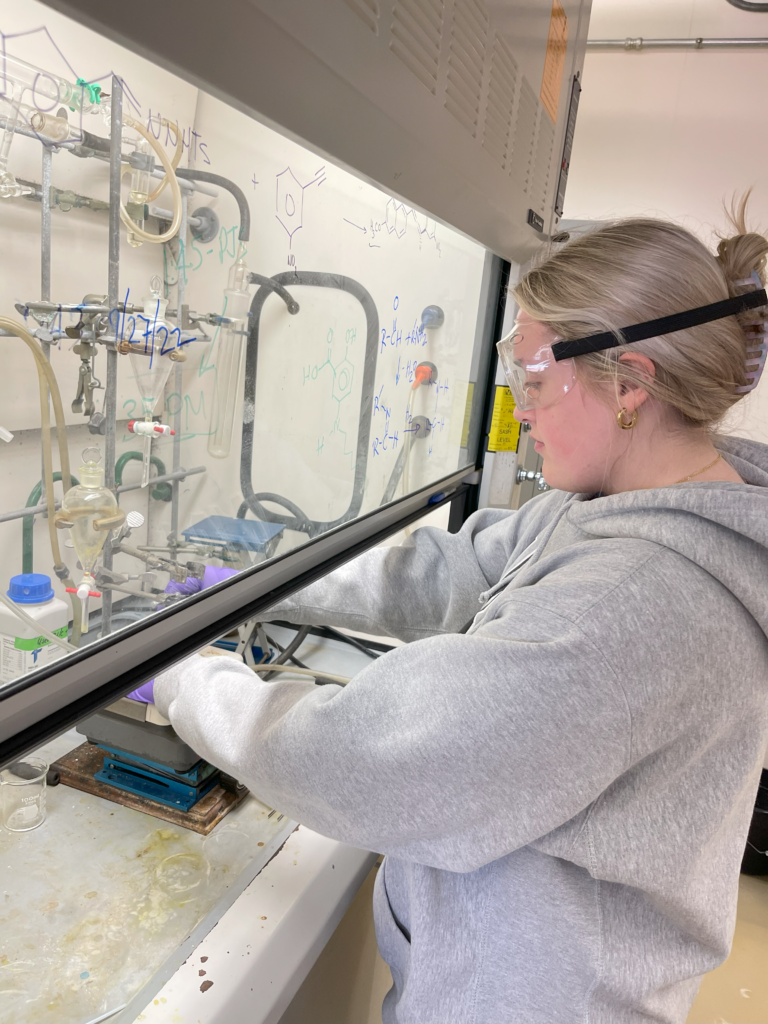
For nearly three decades, Paul Smith has put undergraduate mentorship and the motivation of bettering human health at the forefront of his work. He’s been recognized for his efforts as the most recent recipient of the Braude Award from the Maryland Section of the American Chemical Society (ACS). The annual award recognizes one chemist from Maryland who has demonstrated a long-term commitment to mentoring undergraduate researchers in the chemical and biochemical sciences. Smith will give a scientific talk at the chapter’s October meeting, and the award includes a $4,000 prize to further support undergraduate research.
Smith has trained more than 70 undergraduates in his laboratory over his 29-year career at UMBC. Many of them have been recognized for their outstanding work at the department and the university level, as well as by outside organizations such as the ACS and Pfizer. His research group does not always include graduate students or postdoctoral fellows, so “the undergrads learn from me directly, which is fun,” he says.
Despite his many years of experience, Smith continues to approach his work with contagious childlike curiosity and enthusiasm. “I tell the students, I love doing this because I’m going to make a molecule no one has ever made before, and that’s a pretty cool feeling,” he says. “And also, it’s a long shot, but you could discover something that’s really going to be beneficial to human health. It’s motivating.”
Paying mentoring forward
Smith is a synthetic chemist, which he describes as the “bricklayer” of the chemistry world. He and his students coax various molecular structures into existence by carefully facilitating intricate chemical reactions. Throughout his career, Smith has worked on synthesizing molecules with activity against cancer cells, hepatitis C, and influenza. Some of these molecules have also shown a promising ability to reverse antibiotic resistance in some bacteria. Right now, he and his students are working on improving compounds that may help fight influenza and reduce antibiotic resistance.
Smith conducted research as an undergraduate at SUNY-Brockport and in a summer Research Experience for Undergraduates at the Roswell Park Cancer Center in Buffalo, New York.
 Paul Smith enjoys helping prepare his students to present at research conferences, such as UMBC’s Undergraduate Research and Creative Achievement Day, seen here in 2023. (Photo courtesy of Smith)
Paul Smith enjoys helping prepare his students to present at research conferences, such as UMBC’s Undergraduate Research and Creative Achievement Day, seen here in 2023. (Photo courtesy of Smith)
“Both of those experiences allowed me to immerse myself in research as an undergraduate,” Smith says, “so I think because of that, it’s always been important to me to include undergrads in the research that we do in my lab.”
Brian Cullum, professor and chair of chemistry and biochemistry, nominated Smith for the Braude Award. “Even with the significant potential health and environmental benefits that his ongoing research efforts can address, Dr. Smith continues to be dedicated first and foremost in his career to training undergraduate researchers in preparation for their future roles as independent scientists,” Cullum shares.
A focus on connections
Many advances in Smith’s career have come from interpersonal connections, both in his department at UMBC and with external researchers. When Duke chemist Kathy Franz discussed compounds to address antibiotic resistance in a seminar at UMBC, Smith recognized that her compounds included a similar structure to the molecules he was investigating for activity against influenza. He spoke to her after the talk, which eventually led to a collaboration and a promising new line of research in his lab.
 Lillian Kidd, who has received mentoring from Paul Smith, conducts an experiment in his lab. (Photo courtesy of Smith)
Lillian Kidd, who has received mentoring from Paul Smith, conducts an experiment in his lab. (Photo courtesy of Smith)
“Serendipity is the word of my career,” Smith jokes, although it’s not just luck. He encourages his students to attend as many seminars as possible, and he leads by example. “You’ll learn something at every talk, even if it’s far outside your field,” Smith says.
Lillian Kidd ’24, biochemistry and molecular biology, spent two years in Smith’s lab as an undergraduate, and as a result, she says she is dedicated to pursuing a career in designing and synthesizing therapeutic compounds. She will begin graduate school at Brown University this fall.
“Beyond learning fundamental research techniques in organic chemistry, Dr. Smith pushed me to think critically about every decision I made in the lab. He taught me how to transform core principles from coursework into reality, which has impacted my analysis skills and encouraged my curiosity,” Kidd says. “Dr. Smith’s mentorship emphasizes that success comes with integrity, deep understanding, and the ability to pivot when research does not work the way you thought it would.”
Shauna Kearney ’25, chemistry, has also benefited from Smith’s mentorship. She plans to pursue graduate school in organic chemistry based on her experiences in his lab.
“Being a member of Dr. Smith’s lab has allowed me to take ownership of my own research project as an undergraduate,” Kearney says. “While he helps me solve problems in the lab, he pushes me to think through them first and come up with my own solutions.”
Shared commitment
Smith’s personal commitment to supporting undergraduate research fits right into the fabric of UMBC. “I love our department, and I love UMBC,” he says. “I think one of our strengths, and what I tell students, is that they have a really good chance of getting into a lab—and my understanding is that’s fairly unique. But here, it’s unusual to find a lab that doesn’t have at least two or three undergrads.”
Smith’s equal dedication to his research and his students is exactly what the Braude Award selection committee looks for in nominees.
“I cannot imagine another individual more fitting for this prestigious award celebrating a faculty member’s tireless dedication to undergraduate research and training,” Cullum says. “Paul’s lifelong dedication to guiding undergraduate research and teaching his students to apply classroom concepts to solve challenges in their research projects embodies the ideal research mentor.”





